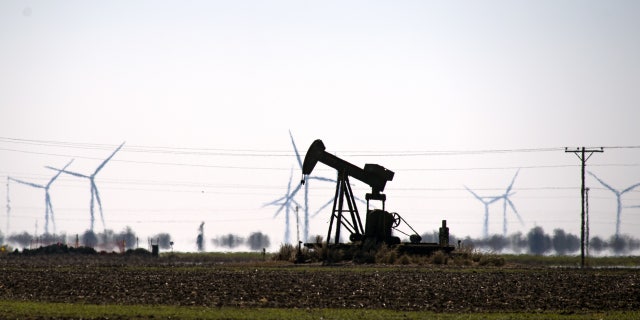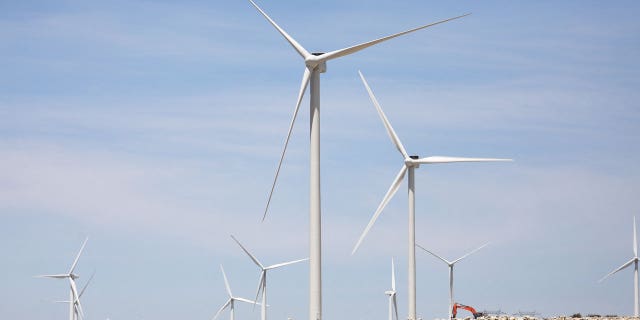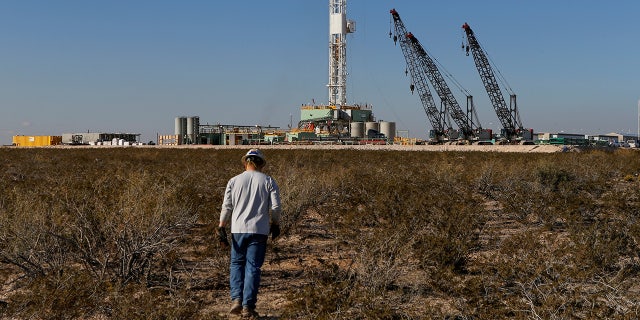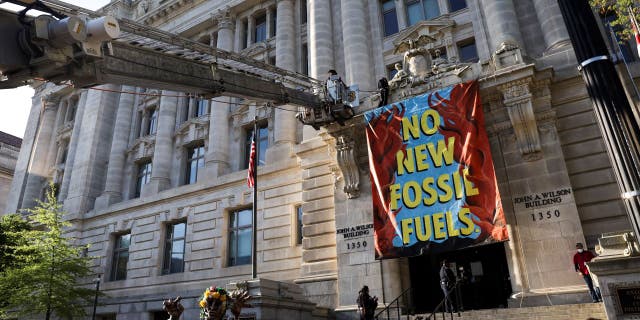Environmentalists seeking to halt U.S. oil and gas production in the name of combating climate change are undermining their own agenda and risking greater damage to the planet, according to a new report.
The Institute for Energy Research (IER) released a paper showing that the U.S. is the most environmentally friendly major energy producer and arguing that, like it or not, because petroleum products are here to stay, limiting U.S. production would have a devastating effect on the environment.
The report comes as Alaska Republicans and Native leaders are urging the Biden administration, which has committed to a complete transition away from fossil fuels, not to kill a major oil project in the state.
A major hurdle for the administration, according to IER, is that global efforts to curb oil and gas production haven't lessened the world's reliance on fossil fuels for energy — petroleum products are entrenched in modern society to such a degree that fossil fuels and modernity have become all but inseparable.

President Joe Biden speaks at the University of Tampa on Feb. 9, 2023. (Joe Raedle/Getty Images)
ALASKA REPUBLICANS DEMAND BIDEN 'BETTER NOT KILL' LATEST WILLOW PROJECT OIL DRILLING PROPOSAL
"Nearly every facet of modern developed economies requires petroleum products and natural gas to function and provide the comfortable lifestyles that citizens of developed countries have come to expect," the report states. "These resources are necessary for agriculture, heavy industry, transportation by all modes — road, rail, air, or ship — and a great number of the products that we take for granted. They're ingrained in almost everything."
As a result, the report continues, efforts to reduce or eliminate oil and gas production in developed countries will simply shift production to other countries in order to meet global demand that's not going away.
In other words, if the U.S., the world's largest producer of both oil and natural gas, reduced its production significantly, other energy producers — such as China, Russia, and Saudi Arabia, among others — would likely pick up the slack, thereby not leading to any drop in global fossil fuel use.
Such a scenario wouldn't simply mean the same level of supply, just from different sources. The environmental situation would change significantly — but not for the better.

An oil pump jack in a field with wind turbines in Corpus Christi, Texas, Feb. 19, 2021. (Getty Images)
CALIFORNIA'S GRID FACES COLLAPSE AS LEADERS PUSH RENEWABLES, ELECTRIC VEHICLES, EXPERTS SAY
"The great irony is that this political movement — which purports to be about protecting the environment — results in oil and natural gas production moving from countries with the highest environmental standards to countries with lower, or even functionally zero, environmental standards," IER argues, explaining other major energy producers have far lower environmental standards than the U.S.
IER quantified just how much more environmentally friendly the U.S. is by using the well-known Environmental Performance Index (EPI) produced by Yale University.
The average EPI score for the 20 largest oil producing countries outside the U.S., according to the report, is 39. America's EPI score is 51.1, meaning the average barrel of non-U.S. petroleum is produced in a country with an environmental score that is 23.6% lower than that of the U.S.
As for natural gas, the average EPI score for the 20 largest non-U.S. natural gas producers is 38.6. America's score is the same, meaning the average billion cubic feet of natural gas is produced in a country with an environmental score that is 24.5% lower than that of the U.S.

Wind turbines in Palm Springs, California. Many environmentalists want to transition from fossil fuels to renewable energy such as wind and solar. (Reuters/David Swanson)
FOSSIL FUEL PROFITS ARE VITAL FOR GREEN ENERGY PROJECTS DEMS ROUTINELY TOUT
America is only outranked on environmental quality by three of the top 20 oil producers (Norway, the United Kingdom and the United Arab Emirates) and three of the top gas producers (Norway, Australia and the United Arab Emirates). However, none of these countries produce even one quarter of the volumes of oil or natural gas that the U.S. does.
"The sheer size of U.S. production combined with its excellent environmental standards means that U.S. production disproportionately reduces the environmental harms of oil and gas production on a global scale," the report states.
IER also details how air pollution and emissions have steadily declined in the U.S. over the last several decades as oil and gas production have increased.
"A barrel of oil produced in Saudi Arabia or Venezuela rather than the U.S. on net is more negatively impactful to the global environment," the report concludes. "This inescapable fact must be part of the policy discussion in developed economies as loud special interest groups seek to shut down safe and clean domestic oil and natural gas production. The world demands oil, natural gas, and their associated products. It is far better for the environment if that demand is met by production in countries like the U.S. with high environmental standards."

An oil worker walks toward a drill rig after placing ground monitoring equipment in the vicinity of the underground horizontal drill in Loving County, Texas, Nov. 22, 2019. (Reuters/Angus Mordant)
FAR-LEFT ENVIRONMENTAL GROUPS CONDUCTED INTERNAL BIDEN ADMIN TRAININGS, DOCUMENTS SHOW
IER's paper backs what leaders in the U.S. oil and gas industry told Fox News Digital.
"The U.S. is the world leader not just in production but how production happens," said Tim Stewart, president of the U.S. Oil and Gas Association. "There is a complex and robust overlay of federal and state environmental laws designed protect every aspect of the environment from groundwater protection and air quality to sensitive or endangered species to sacred archeological sites."
"A typical oil and gas operator working on federal lands in the west must comply with over 100 different federal and state statutes to bring energy out of the ground and get it to market," Stewart continued. "No other place in the world has this level of required compliance. The result is we produce without a doubt the cleanest fossil energy in the world."
Still, efforts to limit or halt fossil fuels are gaining traction in some states and the federal government. In New York, for example, the state Senate on Wednesday passed a sweeping climate bill that would give the state-run power authority greater ability to build renewable generation and mandate fossil fuel plant shutdowns.

The fire department uses a ladder truck to remove environmental activists after they scaled the Wilson Building as part of an Earth Day rally against fossil fuels on April 22, 2022, in Washington, D.C. (Kevin Dietsch/Getty Images)
SOCIALISTS CHEER DEM STATE’S CLIMATE BILL MANDATING FOSSIL FUEL SHUTDOWN: ‘WILL TRANSFORM NEW YORK’
In Alaska, meanwhile, Republican and Native leaders are asking the Biden administration to allow a major oil project to continue unfettered.
Their concerns came after the U.S. Bureau of Land Management conducted an environmental review earlier this month of an initial proposal of ConocoPhillips Alaska's Willow project, ultimately reducing the number of proposed drill sites. Lawmakers have warned any further reductions would kill it altogether.
After the administration scaled back the Alaska project, Sen. Jeff Merkley (D-Ore.) wrote that approving "new fossil fuel projects worsens climate chaos and undermines the leadership role the U.S. has said it will take in addressing the climate crisis. We need to rapidly transition away from fossil fuels and not approve new oil and gas projects. Period."
President Biden infamously promised to "end" and "get rid of" fossil fuels while campaigning for president. Since entering the White House, he's said his goal is to create a "carbon pollution-free power sector by 2035 and net-zero emissions economy by no later than 2050."
Biden has also committed by 2030 to cut U.S. fossil fuel emissions by 52% and for half of all new vehicles sold in the U.S. to be electric.
In his State of the Union address earlier this month, Biden said the country is "still going to need oil and gas for a while" before adding, "We're going to need oil for at least another decade and beyond."
According to Stewart, the White House's policies are being pursued without a clear plan to actually replace oil and natural gas, whose demand are only growing.
CLICK HERE TO GET THE FOX NEWS APP
"The White House in its race to take the cleanest fossil energy off the market is doing so without a viable replacement," said Stewart. "The global demand for fossil energy will be 110 million barrels a day by 2025, and that energy has to come from somewhere. If we don't produce it at home, where regulations ensure responsibility, the global market and global players will seek it out from other countries, many which are rife with corruption and where government officials can easily be bought off by bad actors. The best thing for global environment would be to not give those bad actors that opportunity. So that requires even more emphasis on robust U.S. production."
The White House didn't respond to a request for comment for this story.
"oil" - Google News
February 17, 2023 at 04:59PM
https://ift.tt/WY7l1o6
Going black, not green: Curbing US oil, gas production would hurt the environment, report finds - Fox News
"oil" - Google News
https://ift.tt/R5hLaUf
Shoes Man Tutorial
Pos News Update
Meme Update
Korean Entertainment News
Japan News Update
Bagikan Berita Ini














0 Response to "Going black, not green: Curbing US oil, gas production would hurt the environment, report finds - Fox News"
Post a Comment